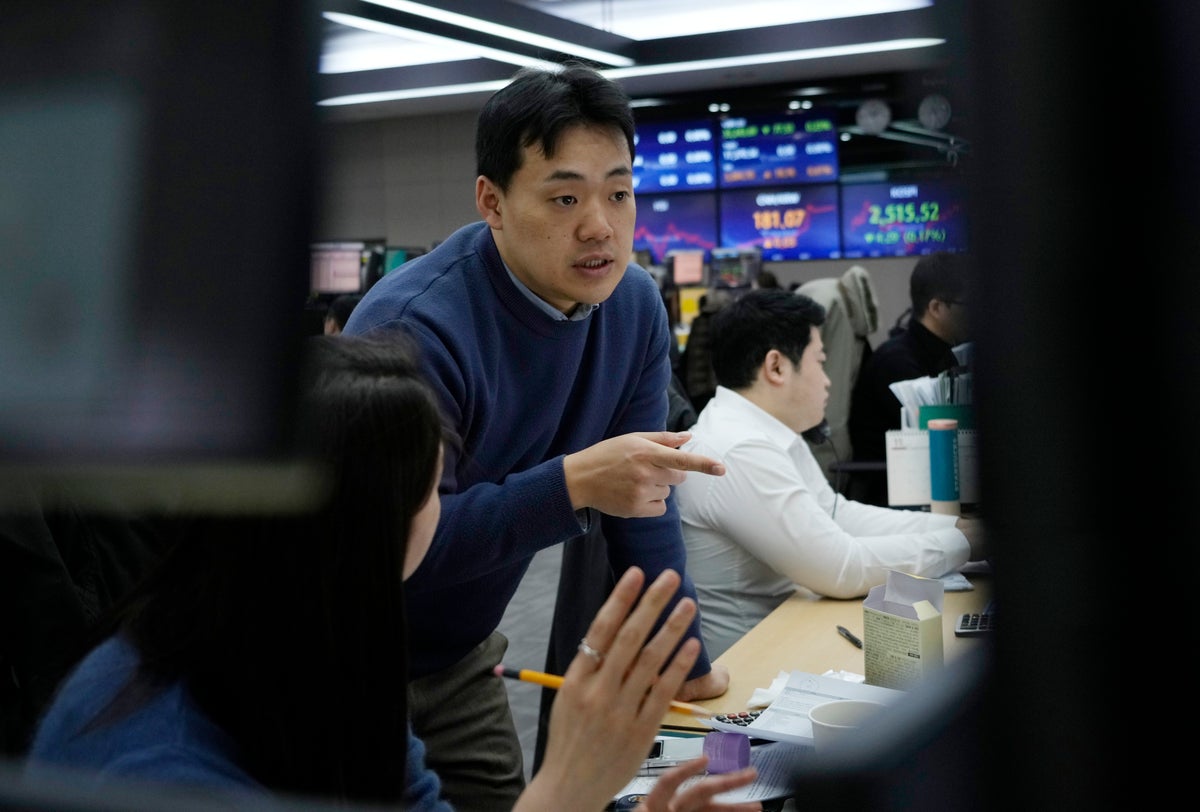
Asian shares were mostly higher Thursday ahead of an update on U.S. consumer inflation and a meeting of oil producers in Vienna.
U.S. futures rose and oil prices also advanced.
Later Thursday, the U.S. government is due to release its October data on the Federal Reserve’s preferred measure of inflation. Economists expect that measure to continue easing, as it has been since the middle of 2022. The Federal Reserve is expected to keep its benchmark interest rate steady when it meets in December and to eventually begin paring rates down if inflation remains under control.
Wall Street got the encouraging news Wednesday that t he U.S. economy grew at a brisk 5.2% annual pace from July through September, an upgrade from the earlier estimate of 4.9%. Consumer spending, the lifeblood of the economy, rose at a 3.6% annual rate from July through September. That’s still healthy, but a downgrade from the previous estimate of 4%.
The prospect of a potential easing of interest rates has relaxed upward pressure on the U.S. dollar, allowing currencies like the Japanese yen to gain. That could relieve inflationary pressures that have cast the Bank of Japan's longstanding lax monetary policy into question.
In Asia, Tokyo's Nikkei 225 gained 0.5% to 33,486.89.
The Hang Seng in Hong Kong was up 0.2% at 17,030.49. The Shanghai Composite index added 0.3% to 3,029.67.
An official survey of Chinese factory managers showed manufacturing to be in contraction in November, indicating further weakness in the slowing Chinese economy despite recent signs of improvement.
“The latest surveys suggest that the economy continued to lose steam in November. However, they may be overstating the extent of slowdown due to sentiment effects,” Sheana Yue of Capital Economics said in a commentary.
South Korea's Kospi advanced 0.6% to 2,535.29. In Australia, the S&P/ASX 200 climbed 0.7% to 7,087.30. In Bangkok, the SET fell 0.5%. India's Sensex lost 0.2% and Taiwan's Taiex picked up 0.4%.
The members of OPEC+, whose oil income props up their economies, are due Thursday to try to forge a consensus on production cuts after postponing a meeting originally set for Sunday.
U.S. benchmark crude oil was down 5 cents at $77.81 a barrel in electronic trading on the New York Mercantile Exchange. It gained $1.45 on Wednesday to $77.86 a barrel.
Brent crude, the international standard, added 2 cents to $82.90 a barrel.
On Wednesday, Wall Street capped a choppy day of trading with a mixed finish as a late-afternoon pullback among several Big Tech companies offset gains elsewhere in the market.
The S&P 500 closed 0.1% lower, at 4,550.58, after having been up by 0.7% earlier in the day. The Dow Jones Industrial Average had been up 0.5% before finishing with a gain of just 0.1%, at 35,430.42. The tech-heavy Nasdaq composite fell 0.2% to 14,258.49.
Facebook parent company Meta fell 2%, Google’s parent company Alphabet gave up 1.6% and Microsoft dropped 1%.
Still, gainers outnumbered decliners by a nearly 2-to-1 margin on the New York Stock Exchange.
Automakers were among the bright spots. General Motors surged 9.4% after the company announced a big stock buyback, raised its dividend and told investors it won't have any trouble absorbing the costs of its new labor contract. The stock is still down 6.1% for the year, while the S&P 500 is up more than 18%.
GM and its rivals agreed to new contracts with the United Auto Workers and Canadian auto workers in late October following strikes that lasted more than a month.
Ford rose 2.1% and Jeep maker Stellantis rose 5.3%.
Treasury yields fell, taking more pressure off of stocks. The yield on the 10-year Treasury, which influences mortgage rates, slipped to 4.27% from 4.33%. The yield on the 2-year Treasury fell sharply to 4.66% from 4.75%.
Several stocks rallied Wednesday after delivering strong financial updates. NetApp jumped 14.6% after easily beating analysts’ forecasts for earnings in its latest quarter and raising its outlook for the year.
Las Vegas Sands slid 4.9% after Miriam Adelson, the casino operator’s controlling shareholder, sold some $2 billion in stock.
In currency dealings, the dollar slipped to 147.08 Japanese yen from 147.24 yen. The euro was unchanged at $1.0971.







